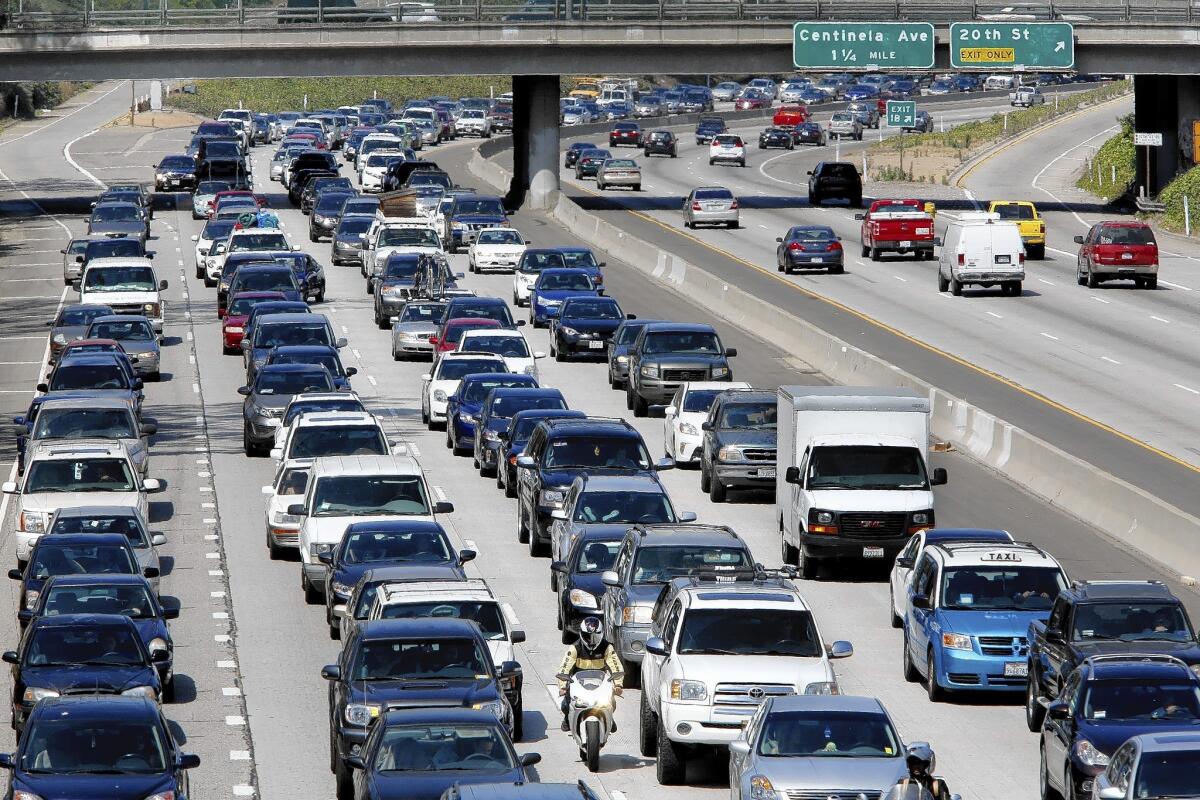Lawmakers urge change to carbon emissions plan

- Share via
Reporting from Sacramento — As California gas prices climb, a group of moderate and pro-business Democratic lawmakers is voicing concerns about the cost to drivers of state regulations to curb carbon emissions set to take effect next year.
As part of a landmark law passed in 2006, motor vehicle fuel will be subject to new price pressures starting in January, and the change could add at least an estimated 15 cents to the average price of regular unleaded gasoline.
Both industry and environmental groups generally agree on the estimated cost.
With a crisis in the Middle East, prices are already on the increase, and regular gas currently sells for an average price of $4.14 a gallon in the Los Angeles-Long Beach market, according to a national automobile club survey. That’s up 50 cents a gallon since January.
On Jan. 1, 2015, motor vehicle fuels will be included in the controversial state Air Resources Board’s scheme that lets polluters buy and sell the right to release greenhouse gases. Known as cap and trade, the system seeks to cap pollution levels and let companies sell their excess rights to pollute to others.
The expected price hike would weaken the economy “just as California is recovering from the last recession,” wrote Assemblyman Henry T. Perea (D-Fresno), the group’s leader, in a June 16 letter to Air Resources Board Chairwoman Mary Nichols.
It also would hurt “the most vulnerable members of our communities who must commute to work and drive long distances for necessary services like medical care,” Perea said, speaking for the group of 16 Democratic lawmakers.
Perea and his colleagues asked that motor vehicle fuels be left out of cap and trade — or that the program be changed so that it won’t lead to a price jump. The cap-and-trade system should not be used to raise billions of dollars in new state funds at the expense of low-income motorists, Perea said in an interview.
The administration of Democratic Gov. Jerry Brown offered a non-committal response to the Perea letter.
“We received the letter and are developing a response,” said Stanley Young, the air board’s spokesman.
Environmentalists say the state’s powerful oil industry is behind the move.
They urged Nichols and the Brown administration to resist political pressure from the oil companies.
“The people of the state of California have rejected these kinds of policies at the ballot box,” said Adrienne Alvord, California and western states director for the Union of Concerned Scientists. “I say ‘stay the course.’ ”
Oil companies, said Sen. Fran Pavley (D-Agoura Hills), the author of the 2006 anti-global-warming legislation, should not be exempted from California’s climate regulations.
A spokesman for the oil industry’s trade group, the Western States Petroleum Assn., declined to comment on the Perea letter. The association, Perea confirmed, provided him with much of the technical information he used in drafting his letter to Nichols.
Major oil companies and independent producers are influential interest groups at the state Capitol. During the 2011-12 session, they collectively contributed more than $1.1 million in political campaign contributions, according to Maplight.org, a independent compiler of political financial data.
Nichols and the board have spent the last four years putting together a comprehensive and efficient auction system, experts said.
Pavley’s legislation, AB 32, was signed into law by then-Gov. Arnold Schwarzenegger. It requires a reduction in greenhouse gas emissions to 1990 levels by 2020.
The law has survived a number of challenges in the courts and at the polls. In November 2010, more than three-fifths of California voters opposed Proposition 23, an initiative backed by oil companies that sought to suspend all of AB 32.
Brown’s budget for the spending year that begins July 1 estimates that cap and trade would raise more than $550 million. As approved by the Legislature, that money would be spent on high-speed rail construction, transit, low-income housing and other environmental projects.
That money shouldn’t come out of the pockets of motorists who already pay the country’s highest state gasoline taxes, Republican Assemblywoman Kristin Olsen of Modesto said. She and fellow GOP Assembly members plan to send their own letter to Brown calling for a delay in including vehicle fuel in the cap-and-trade program.
Car owners, she said, are about to be “blindsided” by “a hidden tax increase on the price of fuel that every Californian will feel when the program is expanded in January.”
Twitter: @MarcLifsher
More to Read
Inside the business of entertainment
The Wide Shot brings you news, analysis and insights on everything from streaming wars to production — and what it all means for the future.
You may occasionally receive promotional content from the Los Angeles Times.











